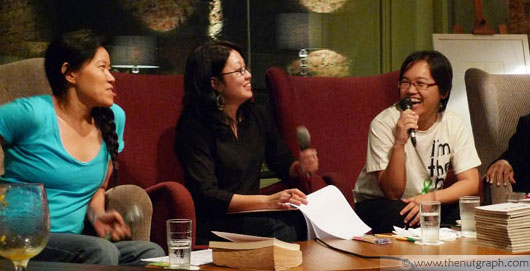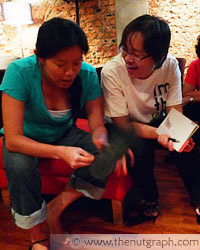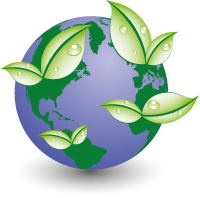ONE problem with the environmental movement is the caricaturing of messages. Save the planet. Save the rainforests. Stop global warming. Green the earth. Recycle, reuse, reduce. Live organic. As useful as these slogans are in environmental education and in persuasion, it’s doubtful how successful they have been in affecting real change. There may even be fatigue about saving the planet. Many people still cling to old habits and comforts, whether out of ignorance, apathy, or plain convenience.
Can people be made to genuinely care about the environment, to the extent that they will change their lifestyles and give up habitual comforts?

The Nut Graph‘s Found in Conversation event on Creativity and Innovation in Eco-Friendly Living explored this question, at the latest forum held on 26 Sept 2010. The panelists were Callie Tai, the chief executive officer of organic foods retailer Justlife Group Sdn Bhd; Toh Su Mei, advisor with responsible development enterprise Wild Asia; and sustainable development consultant Steve McCoy who is also the initiator of Green Drinks KL. The session was moderated by The Nut Graph editor Jacqueline Ann Surin.
Making people care
Without a doubt, humans need to change their relationship with the environment in order to sustain it. Yet, changing cultures and lifestyles so that people will act and live sustainably is difficult. “We have been living unsustainably for so long and what we need is systemic change,” McCoy said.

The answer to whether people can be made to care about planet Earth, McCoy believes, is no. “We can’t make people care about environmental protection and climate change any more than we can make someone fall in love with us. People need their own epiphanies,” he said.
For Toh, her epiphany about changing and adjusting her life for the environment came about because of personal need. Toh, who suffered from a weak ankle, experimented with barefoot-running. She also had eczema and stopped using shampoo and body soap in response to her condition. And in doing so, she has reduced her spending and the size of her ecological footprint.
“I was also reacting against the consumerist culture of buying, using, throwing away, and buying again. [It is a spiral to make you keep on buying things because you feel you need them],” said Toh. She admits that one cannot totally escape a consumer culture but one can at least minimise consumption.

Toh makes her own shoes out of the rubber soles that five-foot way cobblers use to repair shoes, and leather laces or other materials. In place of body soap, she scrubs down with water and a face towel or loofah, rinses her hair with water only instead of shampoo, and brushes her teeth with toothbrush and water but no toothpaste.
As for Tai, she believes people will come to understand environmental needs when it relates to their daily lives. That was how she built up her organic retail business, by slowly convincing staff and customers about what goes into food production and how it impacts human health.
“People are convinced once they learn the truth about what’s in their food,” said Tai. Justlife’s first shop was opened in 1999. In 2005, Just Life Shop became the first government-approved organic retail franchise. The company now has seven retail outlets in the peninsula.
Holistic view of sustainability
Tai acknowledged that customers were skeptical about labels. Among others, consumers wondered if they could trust labels and whether it was worth paying extra.
While organic certification and standards in Malaysia, and even globally, still need to be further developed, Tai said convincing people about buying organic requires a more holistic explanation beyond the farming of produce. And for retailers, being organic should involve far more than branding or labeling, to include practices like fair trade, and perhaps even sourcing from producers that do biodynamic farming.

Any company that claims to practise environmental sustainability must reflect related philosophies throughout its supply chain. “Justlife works with suppliers who work directly with local communities. So there are value-added dimensions to being organic, one of which includes giving back directly to the producing communities,” Tai said of some of the imported fair trade products sold in Justlife stores.
Similarly, it’s why Toh prefers to use the word “responsible” in place of “eco-friendly”, with regards to activities like tourism or development. “Responsible” conveys a more holistic picture of the relationship between humans and the environment, and an entrepreneur’s “duty” to make business sustainable so that it protects the planet and people in the long run.
Likewise, McCoy said corporations and governments needed to reframe environmental issues by taking a multi-disciplinary approach.
“We are used to thinking of issues according to categories. It’s the way we understand and perceive the world. What we should be having is cross-category dialogue. Then what is an environmental issue is also an economic issue, and a social issue,” he said.
He said Malaysia has not been fully able to translate policies into action due to a lack of political will, or due to development plans which contradicted environmental protection policies.
A larger problem is the move from a growth-led economy to a sustainable one where the issue remains whether it is possible to achieve prosperity without growth. “Consumption drives everything and we are stuck in this cycle. They hear the words ‘environment’ and they think of it as cost. Few see it as an investment,” McCoy said.
Starting small
Any change for the planet has to start small, even if it begins with just one individual or company, the panelists agreed. Change at corporate and government levels was only likely to happen in response to mass consumer demand.

Nothing illustrates this better for Tai than Justlife’s pioneering attempt to go plastic bag-free three years ago. Another major retailer which had agreed to launch its own no-plastic bag campaign together with Justlife pulled out because of uncertainty over customer reaction. At Justlife, some customers threw their groceries on to the counter and walked out of the shop. “We certainly lost customers but over the years, with greater awareness, we’ve gained back those we lost and more,” she said.
But look at what Tai has started. Today, no-plastic bag days are the norm in supermarkets and hypermarkets in Selangor and Penang.
Going plastic bag-free years ago was unconventional, and Toh’s shunning of soap and shampoo still is. Clearly, environmentally responsible living in a consumerist society is experimental and will always be against the norm. What then, is the way forward? Tai’s offer? “Ask, ‘why not?’ That’s always a good question to ask. That’s how we get our inspiration.” ![]()
Found in Conversation is a series of conversations hosted by The Nut Graph with our media partner PopRadeeo and venue sponsor Leonardo’s Dining Room and Wine Loft. It aims to link personalities, ideas and people, and to provide opportunities for the public to engage with notable personalities and industry experts.
The next forum, to be held on 24 Oct, will be on creativity and innovation in business. Look out for more information on The Nut Graph website, or follow us on Twitter and Facebook, or sign up for our e-newsletter.
[related-posts]
The Nut Graph needs your support


wai Kuan says
An “organic” shop like Justlife uses plastic bags to pack most of its products. Whereas, when I shop in the traditional kedai runcit, I can bring my own old bags or containers. I have commented on the use of bags to the Justlife shopkeeper and management but have received no response from them. What is the point of bringing home products in plastic bags that can’t be reused? I can’t find any use for the plastic bags that Justlife bag its products with, especially those that come in small packs of 500g.
Chi Chang says
I hope you can feed this back to Callie Tai of Juslife so that perhaps she can practise what she preaches. I personally have stopped shopping at Juslife because of their extensive use of plastics. I invite you to go check out their shop. Many items are stocked only in small sizes. We can’t even attempt to minimise plastics by buying large packs. So what’s the point of having a “no plastic bag” policy when your shopper goes back with tens of bags anyway that their purchases are sealed in?
Perhaps, for a start, items like soybeans can be made available loose and packed to order. And for items which HAVE to be packed in plastic, offer larger pack sizes and use materials that the consumer can try to reuse or recycle.